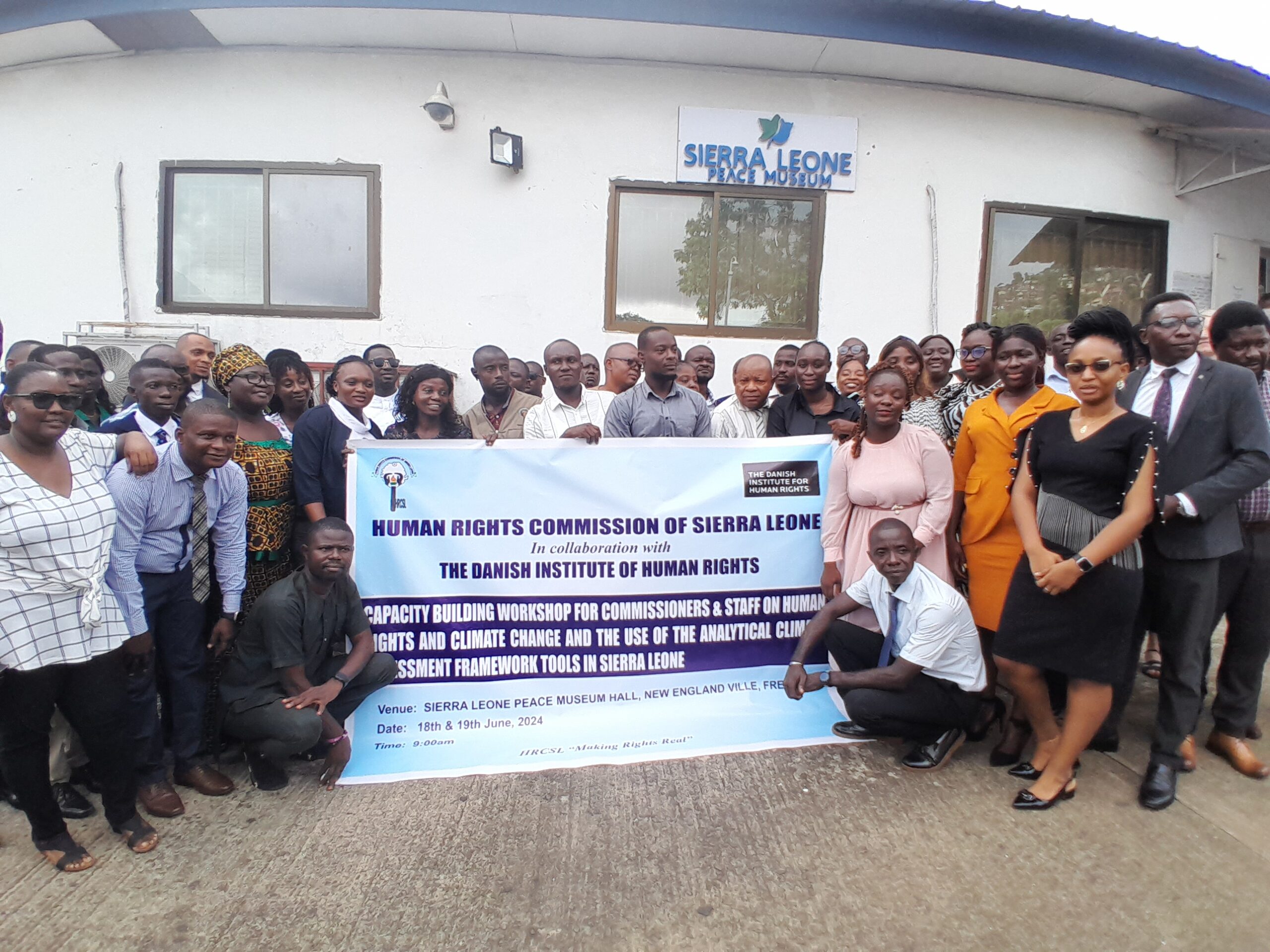By Ibrahim Joenal Sesay
_____________________________
Human Rights Commission of Sierra Leone (HRCSL) in Collaboration with the Danish Institute for Human Rights have conducted a two days capacity building workshop for Commissioners and staff on Human Rights, Climate Change and the use of the analytical climate assessment framework tools in Sierra Leones.
The two-day workshop which started on Tuesday 18th June will end on 19th June at the Sierra Leone Peace Museum New England Ville, Freetown.
In his welcome remarks and the purpose of the training, the Vice Chairperson, Victor I. Lansana Esq. explained that two years ago they established contact with the Danish Institute for Human Rights. He said they believed that the commission cannot do it all by itself that is why they are looking for partners such as the Danish Institute for Human Rights.
He emphasized that capacity building to develop a climate tools is very vital for them as the project is I two phases:
1. Capacity building
2. Right holders to get the impact of climate change in their community
The Deputy Minister of Justice, Lawyer Alpha Sesay welcomed and thanked Maria for the help they are providing to strengthen the human rights in the country.
He expressed joy to have such discussion and welcomed the training from the ministry’s point of view. He pointed out that this is the right moment more so when Sierra Leone is taking its rightful position at the global stage.
He explained the danger of climate change and how if continued will damage the livelihood of people.
He also dilated on the laws to protect the marine stressing that climate change is one of the greatest threats to human existence in the world.
The Senior Human-Rights Advisor for Human Rights and Development from the Danish Institute for Human Rights
Metrological Agency MECC Director General, Ibrahim Kamara pointed out that they are more than ready to support all that related to climate change.
Maria Ploug Petersen of the DIHR spoke about the right to food, water, and life and expressed commitment to work with HRCSL.
HRCSL Chairperson, Commissioner Mrs. Patricia N. Ndanema on behalf of her colleague Commissioners expressed her deepest gratitude to the Danish Institute of Human Rights but particularly to Madam Maria Ploug Petersen.
“Let me thank the Danish Institute for Human for supporting the work of the Change. As a Commission, we see this it Analytical Framework Tool on Climate Change & HR; and 3 and 5 of the Commission’s Strategic Plan 2020-2025 which both in their entirety strongly express capacity building of the commissioners and staff aimed at helping us to effectively on our mandate responding to outcomes 3 and promoting human rights.”
National Human Rights discussions in October, she added protecting and promoting human rights which are not only limited to their Civil and political Rights (CPRs) or the economic, Social and Cultural Rights (ECOSOC) rights 2015, institute but their environmental rights as well, capacity building of Commissioners and staff.
“Institutions as per their mandate have a broader scope of preventing the enjoyment of all other rights. There is a saying which goes, ‘if we emerging can to protect nature We can’t protect ourselves, noting the great role to be played by National Human Rights Institutions in the protection and promotion o of rights, several steps have been taken regionally and the which if not monitored have strong potentials internationally on how Human Rights Commissions can also be part of the global issues such as Climate Change. Global Alliance of National Human Rights Institutions (GANHRI) adopted the Merida Declaration which commits NHRIs to be actively involved in the implementation of the 2030 agenda on Sustainable Development Goals (SLDGS) climate change forms part of as SDG 13 calls for Climate Action”, she stated.

